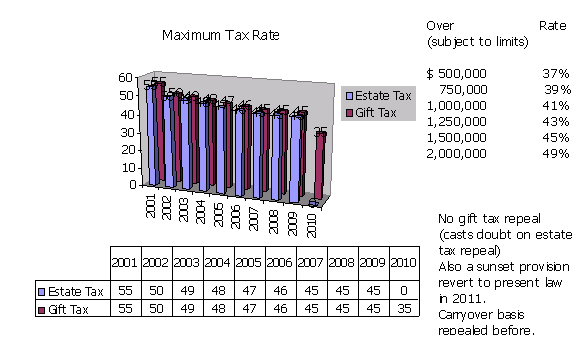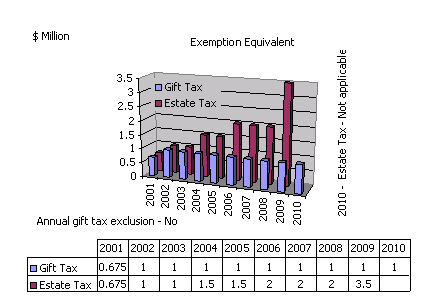Co-written by Tara H. Zane, Esq.
The Economic Growth and Tax Relief Reconciliation Act of 2001 was signed into law by President Bush on June 7, 2001. The new law supposedly repeals the estate tax. However, the new law repeals the estate tax for one year only - 2010. Pursuant to its sunset provisions (and as a result of budgetary restrictions), the new law allows the current estate tax rules, rates and exemptions to come back in force in 2011. The estate tax does continue, with an increasing exemption from $1 million to $3.5 million through 2009 (see chart below), until 2010 when it is repealed only for that year. Further legislation will be required to prevent a reversion back to current rates in 2011. Inevitable shifts in political power (ex: 2 presidential elections before full repeal) leave us in a state of uncertainty about the existence of an estate tax come 2011.
Although the repeal of the estate tax appears to be a political illusion - the gift tax is reduced to 35% in 2010, but not repealed, and carryover basis (see discussion below) has previously been tried and found wanting - there are some important changes to tax rates and to the exemption equivalent, which are summarized below. These changes are phased in over time.
|
Calendar Year |
Estate And GST Tax Deathtime Transfer Exemption |
Highest Estate And Gift Tax Rates |
|
2002 |
$1 million |
50% |
|
2003 |
$1 million |
49% |
|
2004 |
$1.5 million |
48% |
|
2005 |
$1.5 million |
47% |
|
2006 |
$2 million |
46% |
|
2007 |
$2 million |
45% |
|
2008 |
$2 million |
45% |
|
2009 |
$3.5 million |
45% |
|
2010 |
N/A (taxes repealed) |
35% |
The increase in the exemption equivalent seems to be the most important change, as it will substantially reduce the number of estates which are of taxable size. Until "repeal," the rate reductions are modest, from 55% to 45%, in steps.
Before the new law, the federal estate tax was reduced dollar for dollar by the actual amount of state death taxes paid or, if less, an amount determined by formula. The new law reduces this "credit" against federal estate tax, and in later years converts the credit to a deduction (see chart below). It is difficult to predict the effect of these changes. The reduction in the credit will reduce revenues in states such as New Jersey and Florida, which depend upon a credit-based estate tax. By reducing this credit, Congress shifted a greater portion of the cost of tax reduction to the states. This may cause the states to uncouple their death taxes from the federal estate tax, and to raise rates to make up revenue, or even to take revenue ceded by the federal government. The change to a deduction for state taxes paid will make it easier for states to raise their death taxes, as IRS will absorb up to 45% of the increase.
|
Calendar Year |
Maximum Credit Against Estate Tax For State Death Tax Paid |
|
2002 |
75% of current formula |
|
2003 |
50% of current formula |
|
2004 |
25% of current formula |
|
2005 |
0% - instead the actual amount of state death tax paid will be deducted from the estate to determine the federal estate tax |
Another matter of interest is that the estate tax and the gift tax are no longer very "unified." The estate tax is to be repealed while the gift tax is to be retained. The exemption equivalent is to increase to $1 million on 1/1/02 for this unified tax, but on 1/1/04 the estate tax exemption equivalent increases, reaching $3.5 million by 1/1/09, while the gift tax exemption equivalent remains stuck at $1 million. This appears to raise a barrier to lifetime taxable gifts in excess of $1 million, because few taxpayers will choose to incur a lifetime tax on property which may pass free of tax on death (and with a stepped-up basis, until 2010).
It is difficult to take estate tax repeal seriously. Carryover basis, which is linked to repeal in this act, is an administrative nightmare (no one keeps such records) previously abandoned. More importantly, the IRS, the states, charities, banks, life insurance companies and lawyers all have a financial interest in the continuance of the estate tax. While exemptions may increase, and rates may change, wholesale repeal seems very unlikely.
Because we do not take repeal seriously, we will not go into the details of post-repeal taxation. The general framework would be that the current "step-up" in income tax basis to date of death value would be replaced by "carryover" basis (the lesser of the decedent's basis for calculation of gain or loss for income tax or fair market value). In effect, the estate tax would be replaced by the capital gains tax on appreciated property if and when the property were sold. However, up to $1.3 million could be added to the basis of a decedent's property, and a surviving spouse could add up to an additional $3 million to basis, but in each case basis could not be increased above fair market value at death ("modified carryover basis"). The obvious problems are (1) determining the basis of property acquired by the decedent years ago, and (2) allocating the additions to basis. The first problem alone was sufficient to cause the repeal of carryover basis prior to its effective date some years ago, but the availability of up to $4.3 million of additional basis would eliminate the record keeping requirements for those estates whose assets did not exceed in value the available additional basis. Perhaps the limited impact will make it politically palatable despite administrative impossibility.
What is certain is that estate planning is still needed, repeal or no repeal. The estate tax is still very important for estates which exceed the exemption equivalent.
Estate planning is also about more than taxes. At its core, estate planning allows people to ensure that their property will be distributed to the persons and institutions dear to them. That could be spouse, children, grandchildren, charity or others. Assets are distributed according to the titling of assets, beneficiary designations and wills. In the absence of these, state law controls the distribution of a decedent's assets. A will designates how an estate is to be distributed. It also allows you to name a guardian for your minor children. However, certain assets are not controlled by your will. For example, joint property passes to the surviving joint owner, while life insurance and IRAs pass to the designated beneficiary. Review is required to make sure that your will, your beneficiary designations and the way your assets are titled are structured so as to distribute property to your intended heirs.
Trusts will continue to offer opportunities for planning. Incentive trusts can be used to encourage beneficiaries to take certain actions before distributions are made, such as: finishing college or earning a certain amount of money. A trust may be established to have a trustee manage assets on behalf of a minor child or other financially immature beneficiary. A trust can be used to protect assets from a beneficiary's creditors. A special needs trust may be established for a beneficiary who also receives public benefits. In a second marriage situation, a trust can ensure that assets left to a second spouse end up in the hands of children from the first marriage (not the spouse's new partner or children).
In addition, life insurance will remain important, especially for those with business interests. However, you may want to consider reducing life insurance to the extent it was bought to provide liquidity to pay death taxes. Charitable giving will still provide significant income tax benefits during life. However, bequests to charity may decline somewhat in view of the lessened tax advantages at death.
New Jersey inheritance tax still exists and care should be taken to plan your estate accordingly if you intend to leave property to persons other than your spouse and your descendants. The repeal of the federal estate tax does not repeal the New Jersey inheritance tax.
And finally, the repeal of the estate tax is to take place gradually over a number of years (and then be reinstated in 2011). Thus, you could still be vulnerable to a significant amount of estate taxes. Your estate plan should be tailored to you, depending primarily on the size of your estate and your age - but not neglected.


The content of this article is intended to provide a general guide to the subject matter. Specialist advice should be sought about your specific circumstances.

